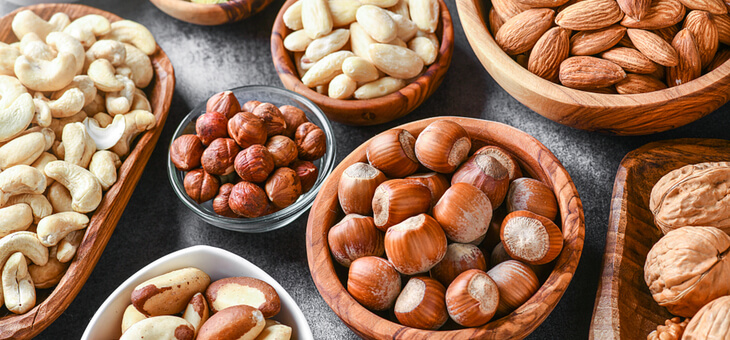Eating nuts is linked to a lower risk of heart disease, although there is some dispute over which nut is best. The two nuts battling it out for top spot are pecans and walnuts.
But on another front – brain health – one nut is a clear winner.
All nuts contain healthy fats and are low in unhealthy saturated fats. Provided they’re not covered in salt, nuts will help keep your heart healthy by reducing the level of ‘bad’ cholesterol (officially known as low density lipoprotein or LDL cholesterol).
Read: Nut that’s best for your heart
Research has been building for decades that walnuts, which are rich in omega-3 acids and antioxidants, are high in protein, fibre, phosphorus and magnesium, are valuable additions to your diet. Studies now conclude that walnuts can slow the spread of amyloid beta proteins that build up in the brains of Alzheimer’s patients.
Countless studies have found an association between diet and health, with plant foods rich in flavonoids and phenols reducing oxidative stress – a known contributor to neurological disorders, cardiovascular disease, hypertension and diabetes.
The Beneficial Effects of Walnuts on Cognition and Brain Health study, based on a10-month study of Alzheimer’s mice and a number of existing research projects, found evidence that “early intervention with a walnut-enriched diet can reduce the risk and/or delay the onset or slow the progression of cognitive decline and dementia”.
Read: Rhubarb and Walnut Muffins
The authors, Professor Abha Chauhan and Dr Ved Chauhan, say the antioxidant and anti-inflammatory components of walnuts act to reduce “the elevated oxidative stress and inflammation involved in the ageing process and dementia “.
“Our studies have demonstrated that walnuts reduce oxidative stress not only by decreasing free radical levels but also by boosting antioxidant defence, thus reducing oxidative damage to lipids and proteins,” they concluded.
The study said that 28 to 56 grams of walnuts per day was recommended.
Of 1113 food items tested for their antioxidant contents, walnuts were ranked second after rosehips. Among dry fruits, walnuts had the best antioxidant efficacy, followed by almonds, cashew nuts and raisins. Another report indicated that 50g of walnuts had significantly more antioxidants than a glass of red wine or a chocolate bar.
Read: Handful of nuts and seeds every day could save your life
The authors say more studies that test the effects of walnuts on brain function in humans are needed.
Healthline.com presents a long list of benefits from eating walnuts, including: better gut health; a reduced risk of some cancers, particularly breast, prostate and colorectal; weight control because they are high in calories and fibre; a lower risk of type 2 diabetes, and lower blood pressure.
It suggests you try walnuts sprinkled on leafy green or fruit salads, ground in dips and sauces, crushed and used as a coating on fish or chicken, roasted, chopped and sprinkled on pasta, vegetables or in a stir-fry and as an oil in a vinaigrette dressing.
If you enjoy our content, don’t keep it to yourself. Share our free eNews with your friends and encourage them to sign up.

